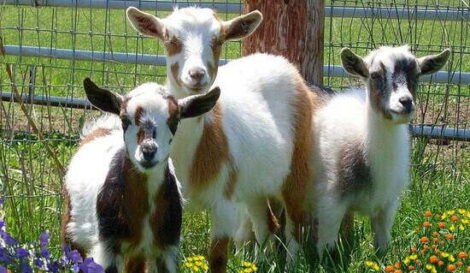Among the unique hobby farm animals, pygmy goats are a friendly breed that makes an excellent pet for a constant supply of fresh milk.
Despite their small size, pygmies can give 1 or 2 quarts of milk per day. Their milk is of exceptional quality and value. Being not bigger than a small dog, these goats require minimum shelter and care.
Their small size and good nature make them attractive dairy goats; and they require less space and feed than ordinary goats, and are suitable for smaller farms in urban and suburban settings. They are also often kept as pets just for the pleasure of companionship. They are good foragers, which makes their milk very nutritious and tasty. Their milk has a very high butterfat content, which makes them preferred for the production of soaps, creams, and other high-fat goat milk products.
Pygmy goats are quite tame and very friendly so they can be let out of their pen for eating: grass, shrubs, weeds, herbs, and leaves. They are easy goats to raise and have a tame and pleasant character. Pygmy goats are active and entertaining and if they are constructed some obstacles in their pen, they could provide hours of entertainment.
History and Origin of Pygmy Goats
The pygmy goats are an American breed of achondroplastic goats. It is small, compact and stockily built. Like the Nigerian dwarf, it comes from the West African dwarf group of West Africa. Around 1930 to 1960, this type of animals was imported into the United States for zoos and researches; some were later kept as companion animals and established as a breed in 1975. It can also be known as a pygmy or an African pygmy. This is a completely different and separate breed from the British Pygmy breed.
Goat Housing
If you’re looking for pets for your garden or want more animals for your farm, pygmy goats are a good idea. Of course, they need special care, but once you know what they need, it’s not difficult to look after them. If you provide a suitable shelter, they can actually live in most climatic conditions.
How many pygmy goats to keep. Like all goats, pygmies are herd animals and will not be happy if kept alone. If you keep a pygmy goat as a pet, they will be very bored. So, I very recommend to buy at least two goats. Keeping them with other goats or even with dogs will help to satisfy social needs.
Determine how big the shelter you need. To do this, you need to consider the weather in your area. If you live in an area with a moderate climate, your goats will not need as permanent shelter as in other areas. If you live in an area with severe winters, you need a proper barn to protect your animals, but it doesn’t have to be very large. You just have to protect your animals from the elements.

The size of your plot depends on how many goats you have. First of all, you must provide 15 to 20 square feet for each goat and preferably more if you have the opportunity because pygmy goats love running and jumping. However, the best fence for pygmies is a wire fence. To keep your pygmy goats from jumping over, the fence needs to be at least 5 feet high since pygmy goats can’t jump higher than that. Remember that fences not only keep goats, but also prevent harmful predators, and pygmies are especially prone to predation, depending on the local wildlife.
Provide them with climbing areas. Pygmy goats are active and entertaining and if they are constructed with some obstacles in their pen, they could provide hours of entertainment. Any picnic table is suitable for this, for example. You can also just make mounds out of soil. Goats have fun with that too. They also like to jump on and off such spots. Old tires are also great toys for your goats.
Goat Fencing
Pygmies are agile and prepared jumpers, and they need enough space for wandering and exercise to avoid unnecessary wear on fencing. However, their small size limits how high they can jump and reduces the chance of damage to your fences. Pygmy goats will bend, stand, and rub, on the fence, especially if there seems to be attractive food on the other side, so the braided wire should be strong enough to withstand. So, it is desirable that the posts should be no more than 8 feet apart. To secure your dwarf goats, this is a wire fence with 2-by-4-inch holes that should be small for the goats to lay their heads.
As all goat owners know, goats are professors at escaping. Goats can, get through holes, open latches, climb, jump, or crawl under fences. And pygmy goats are not the exception, moreover they are even more active and sometimes require higher fences.

Goat fences should be at least 4 feet for most goats and 5 feet for pygmy goats. A wire run as tightly as possible on the top of the fence between the posts at eye level can prevent jumping and climbing. Some prefer to have it barbed or electrified but ordinary wire also works great. Goats are more likely to crawl than climb or jump a fence so the bottom wire should be kept close to the ground. Despite the difficulty in fencing goats there are many fence options to choose.
Woven wire fences are an effective and commonly used fencing option. But it is important to pay attention to the openings. Horned goats can easily get caught in woven wire fences with 6 by 6-inch openings. A good idea is to put an electrified wire about a foot from the ground and 9 inches from the fence but it will only reduce the number of goats caught in the fence. Woven wire fences with 6-by-9-inch and 6-by-12-inch spaces are cheaper and the goats can free themselves if caught.
A safer but more expensive option that many recommend is woven wire with 4-by-4-inch openings this is also a better option if there are predators in the area. A general tip is to have the wire face the interior of the pen or the goats so that if they will push or rub against the wire the force would be directed to the posts rather than the staples.
Electric fencing is cheaper and also effective but only if the goats are trained to respect the fence. This could be done by enclosing them in small paddock with an electric fence so that they would try to test it but won’t have the space to charge it at full speed. Electric fences for goats should have a high electric charge, 4,500 to 9,000 volts.
It is not recommended in using electric plastic net fencing as goats can get entangled in the fencing. Barbed wire, rail, and panel, fences are also good options. But generally, with any types of fencing for goats remember the saying “what doesn’t hold water won’t hold a goat”.
Pygmy Goat Diet
Everyone has probably heard that goats can eat everything. But unfortunately, this is not so. Though they can eat almost everything, but it’s harmful for them, and it spoils the quality of their milk. A variety of human foods are good to feed your Pygmy goats. More than that, fruits and vegetables should be added to their diet.
Allow your goats to graze. Grass, shrubs, herbs, leaves, and weeds such as dandelions and clovers, are the natural food of the goat and will be welcomed as a great treat. Giving them freedom of pasture also gives them the exercises necessary to maintain health and prevent health problems. In summer, goats can feed themselves by grazing in pastures, but of course if you have enough land. If you have a herd of pygmy goats, you will need multiple pastures to accommodate your goats’ needs. In addition, the place where your goats graze should be changed so that the grass and plants can grow back.
Try alfalfa hay. If you don’t have enough space for your pygmy goats, you can feed them alfalfa hay when they can’t graze. Alfalfa is the best that can and should be offered for free feeding. Buy very high-quality hay for the healthiest goats and the highest quality milk. High calcium alfalfa hay, which is important when goats produce milk. Every goat needs 0.5 to 1 kilo of hay a day. But if they get additional grain, they need less.
Supplement their food with cereals. Goats need more feed in winter. In addition, goats that give a lot of milk and young goats need cereal additives even in summer. Suitable grains are corn, barley, and oats.
Provide them with plenty of water. Like all animals, goats need water to survive. But water is especially important for goats because they are ruminants and need more water than other animals to process their feed. Make sure they always have access to fresh, cool, clean water. Especially in hot summers. Remember to clean the water tank regularly and change the water often.
Maintaining the Goats’ Health

- Brush your goats. I recommend brushing your pygmy goats once every several days. I use a simple brush for that, carefully clean the obvious dirt on your goats. Then use the soft brush to brush your goat’s fur. Note: watch for bumps on your goat as this could indicate an infection, cut, or scratch.
- Bathe your goats. Generally, bathe your goats is not necessary, it is mostly done if one of your goats have parasites. Most of the time, brushing is enough for your goats. To bathe your goat, you need to warm the water slightly so that it is not so cold. Soap the goat with an animal or goat shampoo. Use a wash mitt for this. Then, rinse the soap off. It will be easier if your goat is wearing a collar as it will make it easier for you to hold onto it.
- Give them vitamin A. Pygmy goats need vitamin A to keep them healthy. Most of the time, they get this vitamin from green hay or from grazing. If you don’t give them any of this, you should give them corn.
- Give them vitamin D. Like we humans, vitamin D helps goats absorb calcium, which is important for bone health. If your goats are outside most of the time, they will take in vitamin D from the sun. However, if they don’t spend a lot of time in the sun, you will need to give them sun-dried hay.
- Give minerals to goats that graze in pastures. If your goats are only grazing in pastures (and not getting any alfalfa or grain), you should give them a mixture of iodized salt, limestone (grated), and animal bones (steamed and grated). You can provide this mixture in a bucket and the goats will eat it when they want.
- Inject selenium. Selenium is an essential nutrient, but it is especially important if your area has white muscle disease as selenium protects against it. When kids are born, you should inject this nutrient with a needle. The disease causes the bones to calcify, making them whitish. Hence the name of the disease.
- Give vaccinations annually. Your goat must at least be vaccinated against enterotoxemia and tetanus. You can usually buy the vaccines from a feed store and give them yourself. You should also talk to your veterinarian about getting a rabies vaccine. You should also consider vaccinating against Clostridium DC.
- Have them checked out every year. To keep your goats healthy, you should have them checked once a year. This is how you know that your goat has the necessary vaccinations and is healthy.
- Take care of your goats’ hooves. Your goats’ hooves will grow over time and if you don’t trim them, the goats will not be able to walk properly. Use gloves, hoof shears, and a hoof knife to trim them. Tie up or have the goat restrained. You need to have someone hold the goat while you trim the hooves. Notice the growth rings. You should be able to see where the hooves grew. Trim the hooves until they are level with the last growth ring.
By following and remembering this short guide which mentioned various important goat care topics and explain its good qualities and characteristics, you can easily be able to care for your pygmy goats, choose the perfect shelter, build a safe and secure fence, feed and water properly, take care of your goats’ health and finally have fun with your goats.
Michael Feldmann is a farmer and writer in Oklahoma, who studies agriculture and has worked as a journalist for magazines and newspapers around the country. His writing has been published in Acres USA, Rural Heritage, Farming magazine, Farmers Weekly, Permaculture magazine, MOTHER EARTH NEWS, and as a column in Poultry World.
All MOTHER EARTH NEWS community bloggers have agreed to follow our Blogging Guidelines, and they are responsible for the accuracy of their posts.




